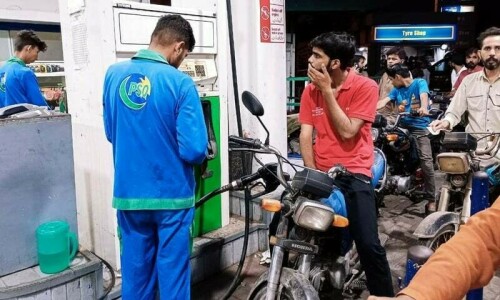KARACHI: Reacting to a major increase in petroleum prices by the interim government, business leaders on Wednesday warned that the decision will cause the closure of 50 per cent of industrial units and trigger mass unemployment.
They said trade and industry, which are already struggling to survive the power tariff hikes of almost Rs10 per unit, cannot bear the increase of Rs17.50 and Rs20 per litre in the prices of petrol and diesel, respectively.
The increase will fuel the existing inflationary pressures and raise the costs of living and manufacturing, they said.
Federation of Pakistan Chambers of Commerce and Industry (FPCCI) acting president Suleman Chawla said the apex chamber repeatedly asked the last coalition government to address problems like the handling of oil cargoes, adjustments in refining processes and transactional procedures in the import of Russian crude.
Business leaders fear closure of 50pc industrial units due to surging costs
International oil markets are in a flux, he said, noting that demand for petroleum products internationally will remain low for a couple of years owing to a slowdown in the global economy. Domestic demand by refineries will not even cross 150,000 barrels per day for imported crude due to the unprecedented slowdown of the national economy, he said.
He urged the government to ensure no further increase in the key policy rate, petroleum prices and electricity tariffs while eliminating any manipulation in the exchange rate to attain economic stability.
Karachi Chamber of Commerce and Industry (KCCI) President Mohammed Tariq Yousuf said the fresh hike in fuel prices will further intensify the hardships of consumers.
He claimed that 50pc of industrial units have already closed down operations while the remaining are battling for their survival.
“We fear that the rest of 50pc industries will also shut down due to the exorbitant energy tariffs,” he said, urging the government to bring down petroleum and electricity prices to lower production costs.
Korangi Association of Trade and Industry (KATI) President Faraz-ur-Rahman said the surging fuel prices will lead to an increase in unemployment and hurt the underprivileged segments of society.
High diesel prices will result in higher transportation costs for goods and adversely impact those industries that are too dependent on cargo shipping and freight services, he said.
He urged the government to prioritise the implementation of renewable energy initiatives.
Pakistan Business Council (PBC) CEO Ehsan Malik said it is unrealistic to expect a temporary government to address the immediate challenges of inflation, devaluation, letters-of-credit opening, utility tariffs etc. These challenges are a result of fundamental flaws that have existed for years in our economy.
He said the country has been living beyond its means while relying on handouts and debt to fund imports, high government expenditure, mounting losses of state-owned enterprises and distribution losses in the energy sector.
The PBC CEO said a five- to six-year International Monetary Fund programme with tranche releases contingent on progress on fundamental reforms, supported by a strong governance and implementation oversight similar to the pragmatic and no-nonsense approach of the Special Investment Facilitation Council (SIFC), can offer Pakistan the hope of stability followed by growth of the economy.
Site Association of Industry President Riazuddin said the caretaker government’s mandate does not allow it to take the reform route or carry out structural changes during its short stint.
He said there is a need to stabilise the rupee below 270, reduce the policy rate to 13pc and impose a full or at least partial ban on luxury, non-productive, and nonessential imports. He also called for reducing the tax burden on industry while bringing agricultural income, real estate, and trade under the tax net.
Published in Dawn, August 17th, 2023















































Dear visitor, the comments section is undergoing an overhaul and will return soon.